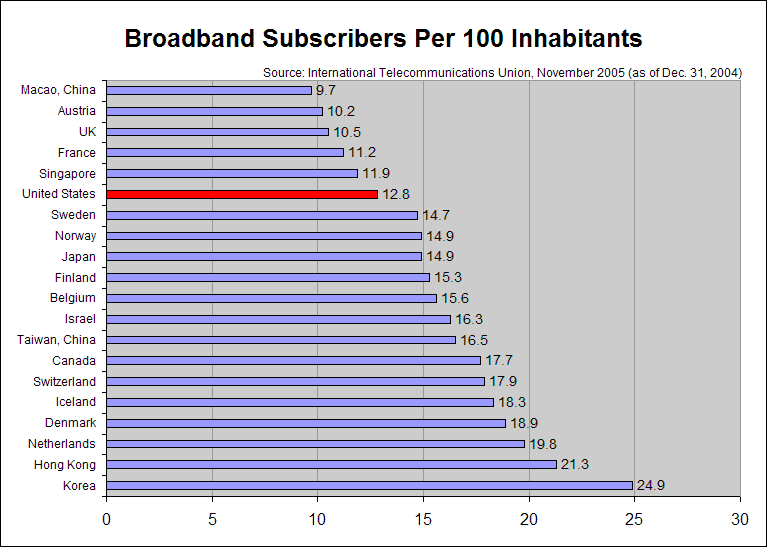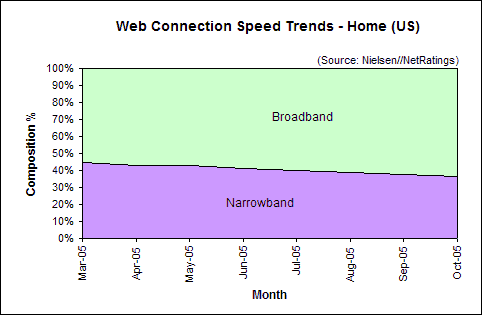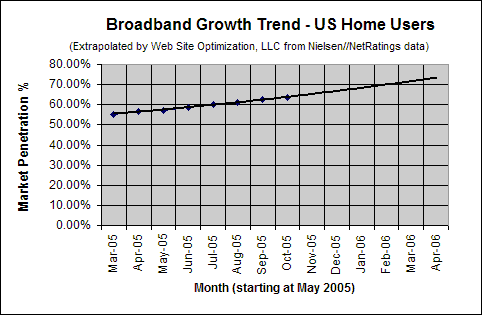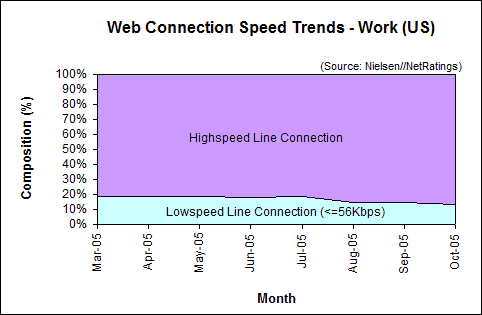The USA has passed Singapore to 15th overall in global broadband penetration per 100 inhabitants. The US rose from 16th to 15th place overall in broadband penetration passing Singapore in a November 2005 ITU report.
US Broadband penetration climbed to 63.76% in October 2005, up 1.3 percentage points from 62.46% in September. The charts below, derived from Nielsen//NetRatings and ITU data, show trends in connection speeds to the Internet for users in the United States and countries worldwide.*
US Passes Singapore to 15th in Global Broadband Penetration
The United States rose to 15th place in broadband penetration among countries surveyed by the ITU in a November 2005 report titled “The Internet of Things 2005, 7th Edition.” As of December 31, 2004, the US was 15th overall in broadband penetration per 100 inhabitants, up from 16th place in June 2004 as we reported in the August Bandwidth Report (see Table 1 and Figure 1). Iceland moved up from 9th to 5th place overall, while Canada dropped from 5th to 7th place overall in broadband per 100 inhabitants. Measured in percentage of Internet subscribers with broadband, the top seven countries are Korea (99.1%), Israel (92.6%), Belgium (79.6%), Canada (69.3%), Austria (61.8%), Hong Kong (60.3%), and the US (59.5%).
Broadband Penetration by Country per 100 inhabitants
Figure 1: Broadband Penetration by Country per 100 inhabitants
Source: ITU.int (data used with permission)
|
|
Home Connectivity in the US
US broadband penetration grew to 63.76% in October among active Internet users. Narrowband users (56Kbps or less) now comprise 36.24% of active Internet users, down 1.3 percentage points from 37.54% in September 2005 (see Figure 2).
Web Connection Speed Trends – Home Users (US)
Figure 2: Web Connection Speed Trends – Home Users (US)
Source: Nielsen//NetRatings
Broadband Growth Trends in the US
In October 2005, broadband penetration in US homes rose 1.3 percentage points to 63.76% up from 62.46% in September. This increase of 1.3 percentage points is above the average increase in broadband of 1.2 points per month over the last five months. At the current growth rate of over 1.1 percentage points per month, broadband penetration among active Internet users US homes should break 70% by February of 2006 (see Figure 3).
Broadband Adoption Growth Trend – Home Users (US)
Figure 3: Broadband Adoption Growth Trend – Home Users (US)
Extrapolated from Nielsen//NetRatings data
Work Connectivity
Most workers in the US enjoy high-speed connections to the Internet. Most use a high-speed line such as a T1 connection, and share bandwidth between computers connected to an Ethernet network. The speed of each connection decreases as more employees hook up to the LAN. As of October of 2005, of those connected to the Internet, 86.41% of US users at work enjoy a high-speed connection, up 1.32 percentage points from the 85.09% share in September. At work, 13.59% connect at 56Kbps or less (see Figure 4).
Web Connection Speed Trends – Work Users (US)
Figure 4: Web Connection Speed Trends – Work Users (US)
Source: Nielsen//NetRatings
Further Reading
- International Telecommunication Union
- Annual survey shows the next step in “always on” communication. Survey of over 200 economies includes broadband penetration data for Dec. 31, 2004. From “ITU Internet Reports 2005: The Internet of Things 2005, 7th Edition,” Nov. 17, 2005. Available on the Internet at http://www.itu.int/dms_pub/itu-s/opb/pol/S-POL-IR.IT-2005-SUM-PDF-E.pdf.
- Nielsen//NetRatings
- Provides the US broadband data (percentage of active Internet users) for the Bandwidth Report.
- Over 40 Million Subscribe to Broadband Internet in the US
- “The twenty largest cable and DSL providers in the US – representing about 94% of the market – acquired a record 2.6 million net additional subscribers in the third quarter of 2005. The top broadband providers now account for over 40.2 million high-speed Internet subscribers – with cable having over 23.2 million broadband subscribers, and DSL having 17.0 million subscribers.” Leichtman Research, Nov. 11, 2005
- Pew Internet
- As of May-June 2005, 68% of American adults use the Internet up from 63% one year ago. Newbies account for only 6% of the adult online Internet population. 53% of Internet users have a broadband connection at home. “Digital Divisions,” Oct. 5, 2005.
*Note that Nielsen//NetRatings new NetSpeed report differs from the previous Web connection data in two ways. First NetSpeed determines the connection speeds of the Digital Media Universe, which combines Web traffic, Internet applications and proprietary channels. The old Web connection data was based solely on Web traffic. The other difference is that the old Web connection data was based on panelists where the linespeeds are known. Since line speeds don’t change often, if a panelists has an unknown linespeed, their previous month’s speed is taken.




